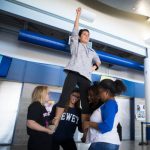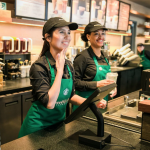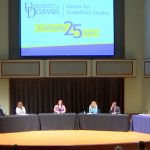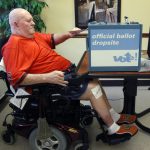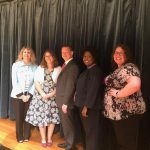Middletown High School senior Tori Hibbard, president of the school’s Best Buddies chapter and captain of the senior varsity cheer squad, created a team of cheerleaders with and without intellectual disabilities. The unified cheer squad performs during home games for the Middletown High unified flag football team.
Twenty-four deaf and hard-of-hearing employees are running Starbucks’ first sign-language store, communicating using American Sign Language. Customers can order in ASL or by writing on a tech pad, and a display screen tells them when their drinks are ready. The store is a step towards providing more employment opportunities for deaf individuals and immersing hearing individuals in deaf spaces.
At two civil liberties events hosted by CDS to mark its 25-year anniversary, elections and disability rights experts ripped the pervasive injustices and inadequate accommodations that suppress voting and political engagement among people with disabilities in the U.S. and around the world. The experts, including a Stanford Law School professor, Delaware’s attorney general and three leaders from Washington, D.C.-based advocacy organizations, cited physical barriers, poll workers’ lack of knowledge, decades-old prejudices and poor enforcement of voting rights legislation, among other factors. They suggested that educating election officials, raising disability awareness and boosting political participation could increase the presence and sway of people with disabilities in elections.
A forum organized by the University of Delaware’s Center for Disabilities Studies focused on how to make voting more accessible for people with disabilities. In 2016, 60 percent of polling places had impediments for voters with disabilities. Forum panelists pointed out that because one in five adults has a disability, people with disabilities could have a powerful impact on elections if they received legally mandated voting accommodations.
The University of Delaware’s Center for Disabilities Studies held a forum on issues related to voting and disability. The panel of national experts discussed how to increase voter participation among people with disabilities, how to engage politicians in issues affecting people with disabilities, and how to include people with disabilities in decision-making processes surrounding elections. Center for Disabilities Studies Director Beth Mineo hopes that the forum sparks further civic engagement in the disability community.

